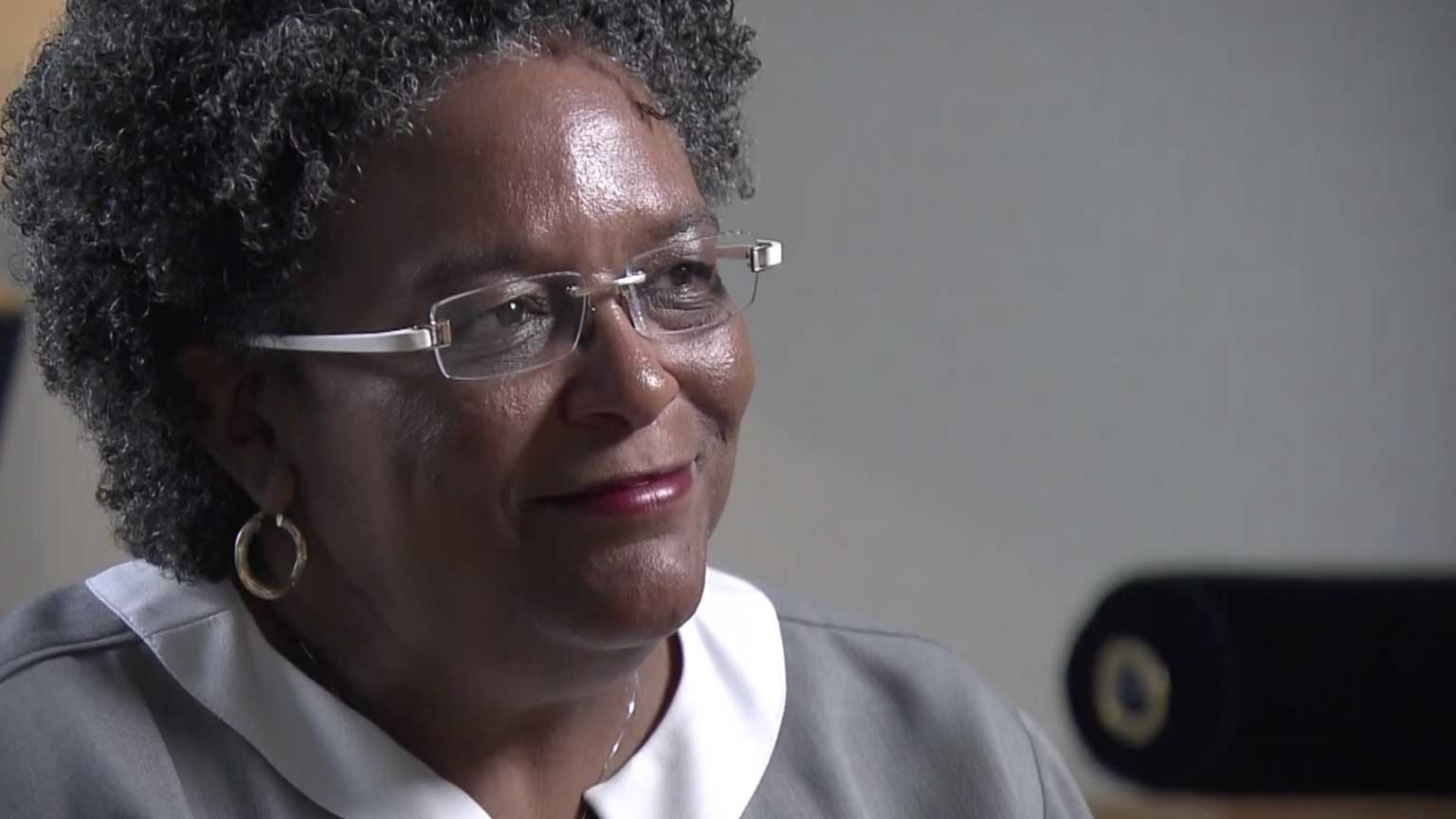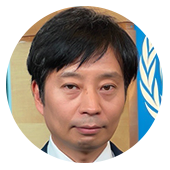Yano Shohei: Barbados is suffering because of climate change. How do you view the responsibilities of the world's developed nations?
Prime Minister Mia Mottley: We have been very clear that the G20 countries are responsible for 80 percent of the emissions that have led to climate change. And we are at a stage now where I don't even call it climate change anymore. It is a climate crisis. The reality is that many of the developing countries do not have the resources to be able to build a resilient infrastructure, to minimize the loss of life, and to minimize the loss of property as a result of the climate crisis. We have said that those who are responsible should help carry some of the costs. That is not unreasonable, because that is how we apply it in private law.
Having said that, we also recognize that it is not only about governments ― it is also about non-state actors, companies who have helped to create the situation. Therefore, we need to find a mechanism within the world where the developed countries play their role, but equally, that we start to make a position for the non- state actors to also contribute, because the scale of the funds required to make the adjustment in what I now call the season of superlatives, the wetter season, the drier season, the hottest day, everything, the scale of resources needed, is so significant, that we cannot rely only on public money. So developed countries need to lead, but they will not be the only ones who will have to play their role.
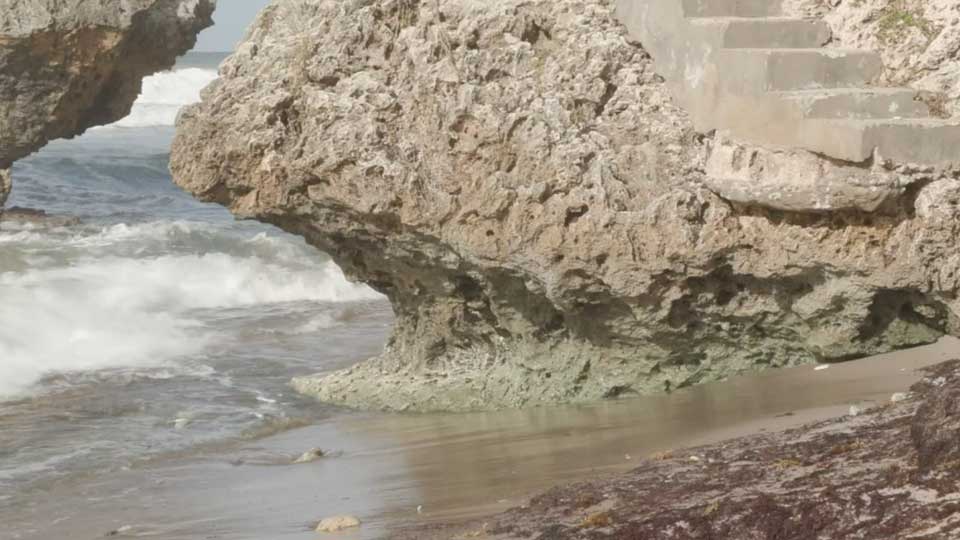
Yano: Could you share your thoughts on the problems with the current global financial system?
Mottley: One of the things that we are very clear about is that the global financial system, which was established in 1945, going forward, the International Monetary Fund, the World Bank, and the precursor to the WTO, the World Trade Organization. All of those were effectively established before many of the world's countries were in fact, members and therefore it does not take into consideration the realities of many of the states of the world today. When that is compounded by the fact that the world is seeing multiple crises, one after the other after the other, it means that the mechanisms which are there to be able to allow for macroeconomic stability, the financing of countries' programs, is just simply not there. And therefore, the Bridgetown Initiative seeks to say that we need one, for example, to have more opportunity for longer term money to be lent to countries, we can't build a school and pay back for it in 10 or 15 years, we need 30, 40, 50 years to be able to have long-term debt to support the Sustainable Development Goals.
Of course, this has been compounded by the climate crisis, and the money that we have to spend, both to recover from a climate event or to build to minimize damage for the next climate event, takes up space. And you can't be asking countries to choose between that, and education, that and healthcare. So we say that we need to reimagine how the global financial system works by making it fit for purpose for the third decade of the 21st century. We also recognize that there's a lot of private sector money, but it's not necessarily coming to the Global South. In Glasgow, projects were announced to be able to help certain countries like South Africa to replace coal, but they haven't gotten off the ground when you start to look at the issue. It is because the interest rates are too high and therefore there is no return on investment. As a result of that, we recognize that there's a disparity in the lending rates to countries in the north, and countries in the south.
And more often than not, that relates to foreign currency risk, as well as other aspects of information that may not be familiar to the people lending or to the credit rating agencies making the judgment call. So these are matters that we are seeking to deconstruct. And to see how best we can lower and level the cost of debt between the global north and the global south. We also recognize that we need to ensure that there is a review of how concessional funds are accessed. If we only allow countries to access concessional funding on the basis of per capita GDP, then it means that those countries like my own, Bahamas, many other states with which you're familiar who have done well, in terms of becoming middle-income countries, but they're still vulnerable. Within 48 to 72 hours, I can lose all of my schools and a large part of my housing stock. So vulnerability has to be a relevant consideration with respect to how countries borrow, and not just per capita income. That is historic, because that doesn't tell the story of the needs of the country. And then of course, finally, issues of debt sustainability are appropriate, we would all like to be down to a traditional metric of debt to be no more than 60 percent of our GDP.
But not even in Europe. Can they achieve that, coming out of the pandemic, the war in Ukraine and all of the other multiple crises? Most countries there are at about 90 percent. And we say we need to make sure that countries bring back down their debt. But the gradient the pace at which they do it needs to be gentler. Because if you don't, if you try to be too austere and too quick in how you bring it down, the people who will suffer are your citizens. And therefore we need to ensure that we have a more gradual approach to bringing down debt and dealing with issues of debt sustainability. That's at the core of it. There are other issues. For example, we want to be able to have the International Monetary Fund review surcharges because in an atmosphere where there are high interest rates, the surcharges almost appear to be punitive. So there are a number of other things but that's at the core of it.
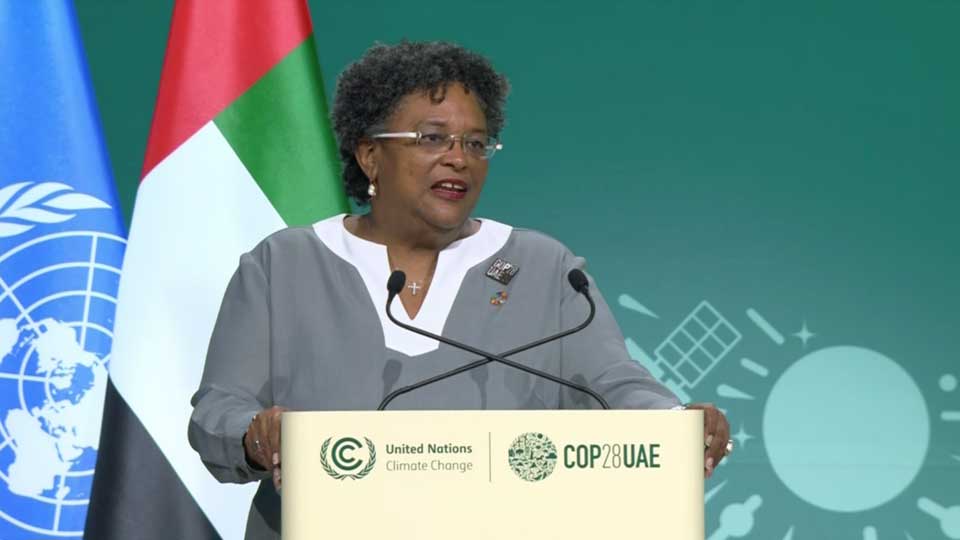
Yano: What do you expect from Japan as a developed country?
Mottley: I think Japan has done a good job playing its role in ensuring that a lot of these global institutions are in a position to be able to assist countries across the world. In particular, we have counted on Japan to be a voice that is rooted in values. And if you listen to much of what I've said in the last few years, I've always been insistent on calling for global moral strategic leadership. Your Foreign Minister visited our country earlier this year. And only yesterday, I met with the Foreign Minister again. And to that extent, we have been able to ensure that we identify where the common platform is, for us being able to fight the climate crisis, pandemic preparedness, dealing with matters pertaining to aging, and a range of multilateral and bilateral issues. I believe that Japan's voice is critical as a developed country, because you have always brought a level of fairness and transparency to the table. And that is what I mean when I talk about global moral strategic leadership.
Yano: China is one of the nations with which Barbados has growing economic ties. What kind of relationship are you seeking?
Mottley: We've had a strong relationship with China now for almost 50 years. And it is a relationship that we believe is critical. China is one of the largest countries in the world; Barbados is one of the smallest. And we've had a relationship that has been based on mutual respect. We have had development cooperation from China, but China doesn't hold more than 4 or 5 percent of our debt. So it's not a disproportionate relationship. And we're not going to be drawn into this notion that Barbados has to choose between one or the other. When we became an independent country, the then Prime Minister in addressing the United Nations for the first time made it clear that Barbados shall be friends with all, but satellites of none. That is still our foreign policy.
Yano: What is the driving force behind your leadership?
Mottley: I believe that we have to do well by people. And that's fundamentally what the sustainable development goals are. If we don't see people, hear people and feed people we're not going to provide for them. We can't have a world where there's so much being held by so few, and then so many who are hungry. We can't have a world where hundreds of millions are still lacking access to basic water and sanitation, or where people are not in a position to be able to have access to education, or basic electricity. You have IT companies, technology companies that have market capitalizations of almost 10 trillion, but yet you have hundreds of millions who have no access to basic education, or in some instances in Africa 600 million without access to electricity. So we feel strongly that every country should be given the opportunity to bring up the quality of life for their citizens.
That's what the Sustainable Development Goals are about. And to the extent that we can't singularly focus on it, it is because other crises have come into the mix. The pandemic ― no one was expecting that ― that has led on average to probably in our country, there was double digit declines because we rely on tourism. You then have the war in Ukraine, which compounded the situation that had developed during the pandemic with the supply chain. And therefore it also led to goods not being made available. And for small states, because our orders are so small, we are obviously not in a position to command access to the market or command prices. So all of these things have come together to make it critical that we say let's pause, and let's get it right. Because when we have a hurricane, and most of our properties are decimated and people are not insured, it is the government that has to step forward. And that's why the debt pause clauses that the World Bank has now agreed to take up and for which Barbados is the largest issuer of bonds with them are so critical, because if we can't pause the repayment of our debt for the two years to help others, then we will end up in an untenable situation.
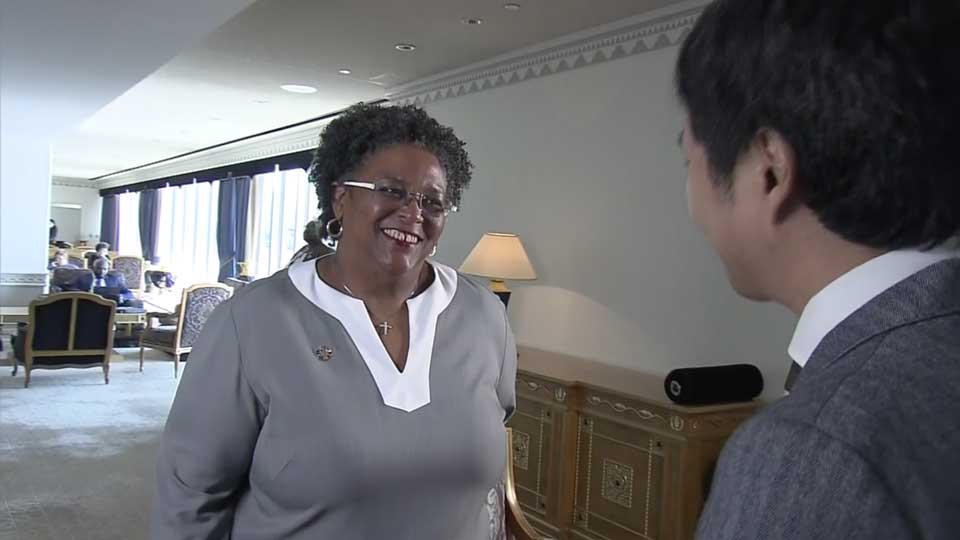
Yano: Some people say you are a strong candidate to be the next United Nations Secretary General.
Mottley: I'm focused on the affairs of Barbados.
Yano: What do you think is required of a UN leader?
Mottley: I think that part of the difficulty that we have in today's world is that we have a multilateral system that countries are not allowing to work. You will not get your way all of the time. If you are working with many people, just think of a family before you even think of, of the states of the world. If four or five people have a decision to make, more often than not there will have to be a spirit of compromise. Compromise should always be rooted in the values and in the charter as far as possible, to ensure that at least we are anchored, but then we can make the differences in terms of our behavior.
Regrettably, we have a world today in which the spirit of compromise seems to be missing, that reduces the effectiveness of the United Nations system. And I think what we have all been saying is that there has to be trust again, people have to trust, countries have to trust one another. And similarly, in so doing, countries have to leave space for the United Nations, as a multilateral entity, to be able to help bridge the gap, where the gap must be bridged among countries, and with policies and programs. We're not seeing the level of cooperation that would help propel the effectiveness of the UN in that way, it may well be that there needs to be a radical overhaul of aspects of the governance of the system, and that there needs to perhaps be some form of independent funding, that the United Nations controls itself, so as not to be the victim of geopolitics.
Yano: Lastly, can you tell us about your goals, and what kind of world you want to create in the future?
Mottley: First of all, I want a world where we have a livable planet. Because if the planet isn't one on which we can live, then life whether it is human beings, or other animals, or whoever in the biodiversity of the world won't survive. Secondly, we can't have a planet alone, and then we don't take care of the needs of individual humans. So questions of access to health care, access to education, just the basic needs that allow human beings to have dignity must be important.
If there was a shortage of global resources, then you would say we have a problem. But we have enough money globally, we have enough resources globally, we can feed everybody globally, we can make sure that everybody has access to what they need. The problem is the distribution. And therefore individual governments, as well as the multilateral institutions, in my view, have to help us reach that level, where we can at least give people a sense of hope when they're born, and it is not dependent on the circumstances of their birth. And if we can achieve that, then we will continue to see improvements in the quality of life. There has been no doubt that in the last century, there has been significant improvement in the quality of life of human beings. But if we are not careful, the same system that helped to carry us in that direction, may propel a level of selfishness and a level of individualism that will leave some winning and many losing. We don't want to see that. We want as many people in this world to live and to win and for the planet to be safe.
